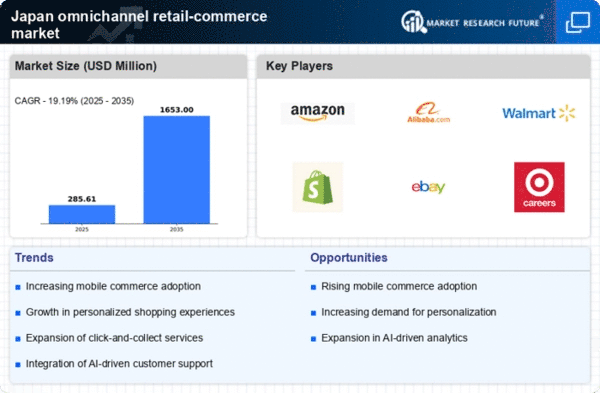The omnichannel retail-commerce-platform market in Japan is characterized by a dynamic competitive landscape, driven by rapid technological advancements and evolving consumer preferences. Major players such as Amazon (US), Rakuten (JP), and Alibaba (CN) are at the forefront, each adopting distinct strategies to enhance their market presence. Amazon (US) continues to innovate its logistics and delivery systems, focusing on same-day delivery options to meet consumer demand for speed and convenience. Rakuten (JP), leveraging its strong local brand recognition, emphasizes customer loyalty programs and partnerships with local businesses to create a unique shopping experience. Meanwhile, Alibaba (CN) is expanding its footprint through strategic investments in local startups, aiming to integrate its vast ecosystem into the Japanese market, thereby enhancing its competitive edge.
The business tactics employed by these companies reflect a nuanced understanding of the local market. For instance, localization of services and products is paramount, as companies strive to cater to the specific preferences of Japanese consumers. The market structure appears moderately fragmented, with a mix of established giants and emerging players, each contributing to a competitive environment that fosters innovation and responsiveness to consumer needs. The collective influence of these key players shapes the market dynamics, pushing for continuous improvement in service delivery and customer engagement.
In September 2025, Amazon (US) announced the launch of its new drone delivery service in select urban areas of Japan, aiming to reduce delivery times significantly. This strategic move not only enhances operational efficiency but also positions Amazon as a leader in innovative logistics solutions, potentially reshaping consumer expectations regarding delivery speed. The introduction of drone technology could set a new standard in the market, compelling competitors to adapt swiftly.
In October 2025, Rakuten (JP) unveiled a partnership with a major Japanese telecommunications provider to enhance its mobile commerce capabilities. This collaboration is expected to streamline the shopping experience for consumers, integrating mobile payment solutions with Rakuten's existing e-commerce platform. Such strategic alliances are crucial for Rakuten as they seek to bolster their omnichannel offerings and improve customer engagement through seamless technology integration.
Furthermore, in August 2025, Alibaba (CN) expanded its logistics network in Japan by acquiring a local logistics firm, thereby enhancing its supply chain capabilities. This acquisition is indicative of Alibaba's commitment to establishing a robust operational framework that can support its ambitious growth plans in the region. By strengthening its logistics infrastructure, Alibaba aims to provide faster and more reliable services, which could significantly enhance its competitive positioning.
As of November 2025, the competitive trends in the omnichannel retail-commerce-platform market are increasingly defined by digitalization, sustainability, and the integration of artificial intelligence (AI). Companies are forming strategic alliances to leverage technology and enhance operational efficiencies, reflecting a shift towards collaborative innovation. The competitive landscape is evolving, with a noticeable transition from price-based competition to a focus on technological advancement and supply chain reliability. This evolution suggests that future differentiation will hinge on the ability to innovate and adapt to changing consumer expectations, rather than merely competing on price.

















Leave a Comment